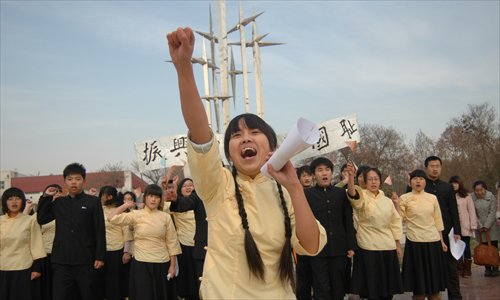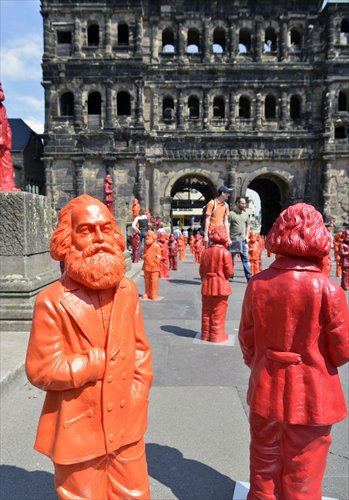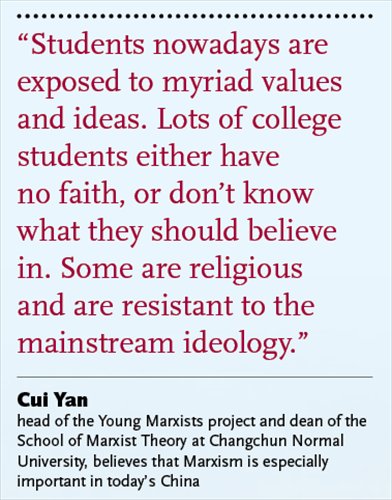China pushes forward Marxist training on campus, attracts 1 million students
As China increasingly stresses ideology in education, some universities are rolling out projects to turn their top students into young Marxists. Through tutorials, field trips to red sites, internships and new media platforms, the project aims to strengthen future elites' commitment to the Communist Party of China.

Students of the Marxism College at Liaocheng University reenact a revolutionary scene from history. Photo: CFP
When Shi Shengyu started college two years ago, he felt lost and confused.
Just like most students his age, he went through a period of anxiety and tried to form a new identity. "I didn't know what kind of faith I should have, or what kind of person I wanted to become," said the math major, now in his junior year at Changchun Normal University, Northeast China's Jilin Province.
His search for a new personality went on until he found his answer in an old philosophy - Marxism.
In the second semester of his freshman year, he saw an advertisement for his school's "Young Marxists" project and has since become one of its most active members. In the past two years, he's attended lectures, led discussions and helped maintain its social media accounts.
Shi is one of the thousands of students at the university who profess enthusiasm for a philosophy which most students feel is rather dry. Over 600 students have signed up for the university's "Young Marxists" project since it was launched in 2012. Each department also has its own Marxist society, and these groups have a total of 4,000 members. The university has around 20,000 undergraduates.
Cui Yan, head of the Young Marxists project and dean of the university's newly established School of Marxist Theory, argues that Marxism is especially important in today's China. "Students nowadays are exposed to myriad values and ideas. Lots of college students either have no faith, or don't know what they should believe in. Some are religious and are resistant to the mainstream ideology," she told the Global Times.
The project is part of an effort at the college, which is where the province's first Communist Party of China (CPC) branch was established 90 years ago, to update ideological education and put into practice Chinese President Xi Jinping's 2013 call to make colleges the breeding ground of Marxism studies.

Sculptures of Karl Marx are displayed at an art festival in Berlin. Photo: IC
Elites only
Not every student can be a "young Marxist." At Changchun Normal University, the opportunity to join this prestigious project is only given to the crème de la crème.
Only 150 freshmen - of the over 4,000 who arrive at the university annually - can join each year. Students have to rank in top 30 percent academically, exhibit a basic understanding of Marxist theory and go through multiple written tests and interviews at the department and university-wide levels before they are admitted.
"It's impossible to turn every student into a young Marxist. But a little spark could kindle a great fire, and these elite students could become the sparks and motivate other students, using their faith in Marxism and understanding of socialist values," professor Cui said, quoting Chairman Mao Zedong.
Guo Yingchun, a sophomore at the university's school of communication, joined the project last year. She said during the final interview, she was asked what she thought was the connection between her major - broadcasting and television hosting - and Marxism.
"I said that if I'm able to master Marxism, [as a broadcaster] I will help it reach a bigger audience and more people would be able to know about Marxism," she said.
Guo was later notified that she had been chosen for the project. Now, she heads the project's reading club, and reads books about Marxist theories via the project's WeChat platform.
Apart from holding Marxism courses for the students each week, the university invites well-known professors from Beijing to hold lectures, and students are invited to attend tutorials and discussion groups. The project also involves trips to red tourism sites such as Jinggangshan, Jiangxi Province, known as the birthplace of the Chinese Red Army, and Tonghua, Jilin Province, where Yang Jingyu, famous commander of the Northeast Anti-Japanese United Army, is buried.
The university also set up a special library for the project, purchasing over 17,000 books, 1,000 digital texts and 100 journals, all about Marxism.
Guo said during one tutorial, students discussed Marx's understanding of capital. "China also has capital, so is it bad or not? We concluded that Marx isn't against capital, but capitalism," she said.

Resources abound
As a perk, Young Marxists can access resources that most ordinary college students can only dream of.
For example, every five to 10 students are assigned a professor as their special mentor, who will give personal guidance to the students regarding their academic, mental and career growth.
Students are also assigned internships during their second year in the program, either at a government organization or in the university's administrative offices. This is a rarity in Chinese universities, as most students need to trawl job websites and go through tests and interviews to earn an internship opportunity.
According to the university's survey of those who have participated in the project, 236 students, or 85.6 percent, became heads of campus student organizations, and over 50 percent joined the CPC, as opposed to the university's 5 percent average.
On the university's online forum, some say the project "is too time-consuming," while some say it's a great platform to access the university's best teachers and resources.
Those who joined say they have benefitted a lot from the program. "Previously, I did everything from my own perspective. After two years' training, I now think of issues from the point of view of our country and society," Shi said. Shi is now has an internship at the university's asset management department.
Guo said, "My roommate used to say, 'Are you being brainwashed?' after seeing me piling books about Marxism on my desk in the dorm. But now, whenever she has a problem, she often comes to me for help."
Student alienation
The "Young Marxists" project isn't an initiative started by the Changchun Normal University, but a nationwide project by the Chinese Communist Youth League (CCYL) started in 2007.
According to the CCYL's website, the project aims to "raise the university elites' knowledge of the Party and strengthen their commitment to following China's socialist path under the leadership of the CPC." The CCYL website adds that this is their "top mission."
The project gained special momentum recently after the central government stressed ideology-based education. According to China Youth Daily, the official newspaper of the CCYL, over 1,000 Chinese colleges have joined the Young Marxists project so far, with over 1 million elite Chinese college students participating. China has about 25 million undergraduate students.
The projects are promoted at a time when Chinese universities are struggling to make Marxism and other ideology-related courses more relevant and appealing to millennials.
Passing a course on Marxism, along with courses on Mao Zedong Thought, modern Chinese history and ideological and moral cultivation, are required for all Chinese college students. Collectively, these courses are called the "thought and politics" courses.
But such courses are also notoriously boring. Many students attend the classes only because the teacher may call the roster, and it is no secret that many use the class to do homework from other courses.
Wang Ning, chairwoman of the Qiushi Association, a student organization at the University of Science and Technology Beijing that focuses on political theories like Marxism, said it's been increasingly difficult for them to attract new members, despite the central government's support.
The association regularly organizes debates and speech contests about socialist core values, the Chinese dream, among other government slogans.
Wang said most students find these theories irrelevant to their daily lives. "They immediately think we're a boring organization and that we're related to the thought and politics courses," she told the Global Times.
Wang said many student organizations in other universities face similar difficulties. In some, membership has dropped by half.
Last August, the Ministry of Education and the Publicity Department of CPC Central Committee jointly issued a document, calling for universities to reform and innovate these courses by adding more interactive and practical elements into the courses and enhancing the teaching staff.
Yin Yungong, an expert on the socialist system at the Chinese Academy of Social Sciences, said changing these courses is urgent for China.
"Ideology is a very important issue, especially after President Xi Jinping emphasized it in his talks. Innovation of these courses meets the needs of this age," he told the Global Times.
"This age" is one in which the CPC is increasingly anxious about young people's seeming alienation from Marxism.
Xi said in a 2014 speech: "The core socialist values should be incorporated into the whole teaching process while ideological guidance should be enhanced to ensure leadership in the universities' ideological work."
Newspaper headline: Courses on Karl